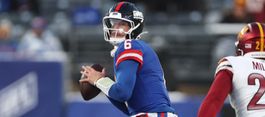Throughout the offseason, we’ve posted plenty of articles on how to value a dynasty draft pick, how coaching changes affect fantasy players, how team-scoring should change the way you draft, among other things. But what about the players themselves? When do they start to drop-off in production?
It’s always been accepted in the fantasy community that a wide receiver’s decline started once they hit the 28-year-old mark, which is why a lot of people are moving on from Dez Bryant (he’s 29). I’m not the type to just accept things as they are without doing research, so I wanted to see if the fantasy results actually matched what everyone essentially just believed.
Get a FREE FantasyPros upgrade with our special offer ![]()
Now look, I’m not telling you that a player’s body doesn’t start to fatigue once he gets past the age of maybe even 25 years old, but it doesn’t mean they don’t find their way into more fantasy points due to their experience in the game, getting better as a route-runner, etc. The only way to test this was to go through data over the last 11 years (started the process last year, hence the odd number), look at players of all ages, with just one requirement to be included at the wide receiver position – minimum of 50 targets in that particular season to be included. By doing that, we’re removing the players who fizzle out of the league after a few years and not letting them affect the data. After removing them, we’re left with a total of 916 individual seasons, which is more than enough of a sample size.
Upside (Top-Five Potential)
This is huge for a lot of fantasy players, as most want a player who can finish top-five at wide receiver, not because of the situation, but because the talent allows him to get there. With this large sample size, you should be able to identify when players hit the depressing drop-off in production.
| Sample | Age | Top-5 Finish |
| 17 | 21 | 0.0% |
| 55 | 22 | 5.5% |
| 103 | 23 | 4.9% |
| 109 | 24 | 5.5% |
| 108 | 25 | 7.4% |
| 108 | 26 | 6.5% |
| 92 | 27 | 8.7% |
| 87 | 28 | 5.7% |
| 60 | 29 | 11.7% |
| 53 | 30 | 3.8% |
| 38 | 31 | 7.9% |
| 29 | 32 | 3.4% |
| 18 | 33 | 0.0% |
| 16 | 34 | 6.3% |
| 10 | 35 | 0.0% |
| 11 | 36 | 0.0% |
| 2 | 37 | 0.0% |
As you can see, a wide receiver does not drop-off at the age of 27 or 28, as most fantasy enthusiasts have accepted as reality. Two of the top three percentages came from the ages of 29 and 31, though there was a drop-off at age-30, so it’s possible that’s the time you start to see a decline, especially when you consider the smaller sample size at age-31. But the fact that there’s been just 2-of-86 wide receivers in the last 11 years to finish top-five after turning 32 let’s you know all you need to know about their lack of upside.
Unlike running backs, it appears that wide receivers don’t hit their prime upside years until 25-29, as that’s the time when their numbers jump. It’s also fascinating that there hasn’t been a single wide receiver to finish top-five before the age of 22, while running backs have had quite a few. Bottom line is that you want to move your wide receivers before they hit the age-32 cliff. Some players who are nearing (or have hit) this age include: Demaryius Thomas, Michael Crabtree, Emmanuel Sanders, DeSean Jackson, and Pierre Garcon.
WR1 Numbers (Top-12)
Now that we know once a player reaches the age of 32, his upside is almost non-existent, but what about his functionality as a top-12 guy (WR1)?
| Sample | Age | Top-12 Finish |
| 17 | 21 | 5.9% |
| 55 | 22 | 10.9% |
| 103 | 23 | 14.6% |
| 109 | 24 | 15.6% |
| 108 | 25 | 16.7% |
| 108 | 26 | 12.0% |
| 92 | 27 | 16.3% |
| 87 | 28 | 16.1% |
| 60 | 29 | 20.0% |
| 53 | 30 | 11.3% |
| 38 | 31 | 18.4% |
| 29 | 32 | 17.2% |
| 18 | 33 | 0.0% |
| 16 | 34 | 12.5% |
| 10 | 35 | 10.0% |
| 11 | 36 | 0.0% |
| 2 | 37 | 0.0% |
This chart was a bit more interesting, because WR1 numbers are a bit more predictable than top-five upside, as you often need quite a few touchdowns to get into that territory. This chart suggests that you can stay positive about a wide receiver’s top-12 potential through their age-32 season. From that point on, you’re better off looking elsewhere, as there’ve been just three individual seasons where someone above the age of 32 has produced WR1 numbers. Those numbers came from Larry Fitzgerald (2017) and Terrell Owens (2007,2008), both Hall of Fame players. The players who are part of the 33-year-old and up club in 2018 include: Fitzgerald, Jordy Nelson, Ted Ginn, and Danny Amendola.
Again, the age-29 season stood out as the best of the bunch, making us believe that’s the height of a fantasy wide receiver’s stock. Some of the players who are entering their age-29 season in 2018 include: Julio Jones, T.Y. Hilton, Mohamed Sanu, and Rishard Matthews.
WR2/WR3 Numbers (Top-24 and Top-36)
As mentioned in the running back piece, some fantasy owners want safety on their roster. Maybe they went RB-heavy in the first few rounds and want to choose some high-floor options at wide receiver. This chart should help identify which players offer the most stability to fantasy rosters.
| Sample | Age | Top-24 Finish | Top-36 Finish |
| 17 | 21 | 29.4% | 41.2% |
| 55 | 22 | 30.9% | 38.2% |
| 103 | 23 | 25.2% | 38.8% |
| 109 | 24 | 29.4% | 45.0% |
| 108 | 25 | 28.7% | 43.5% |
| 108 | 26 | 24.1% | 38.0% |
| 92 | 27 | 30.4% | 46.7% |
| 87 | 28 | 32.2% | 44.8% |
| 60 | 29 | 38.3% | 45.0% |
| 53 | 30 | 22.6% | 45.3% |
| 38 | 31 | 28.9% | 55.3% |
| 29 | 32 | 24.1% | 41.4% |
| 18 | 33 | 33.3% | 50.0% |
| 16 | 34 | 43.8% | 50.0% |
| 10 | 35 | 30.0% | 40.0% |
| 11 | 36 | 9.1% | 36.4% |
| 2 | 37 | 50.0% | 50.0% |
This is where you find the “startable” years of a fantasy wide receiver’s life, even if they can’t be league-winners. There’s a catch to this, however, as it’s typically only the best wide receivers in the game who are still playing beyond the age of 30, which is why we see the sample size dip. Still, it’s reassuring for guys like Larry Fitzgerald and Jordy Nelson to know that they’ve got relatively a 50/50 shot at finishing as a startable fantasy option.
When looking at these percentages, most of them blend together, which makes sense, as we often see players like Kenny Stills or Jermaine Kearse sneak into the top-36, showing that you don’t need elite talent to reach those areas. Despite recency bias saying that rookie wide receivers can’t produce, they absolutely can, as 22-of-72 players at the age of 22 and under finished as top-24 receivers.
What We Learned
We go back to the idea why I wanted to do this article in the first place. Conventional wisdom has always told us that a wide receiver starts his decline around age-28, but if this article has taught you anything, it’s that his prime fantasy finish might still be ahead of him. Sure, some wide receivers might lose upside once they hit 30 years old, but they still have just as good of a shot at WR2 production as anyone else. If you’re in a dynasty league and nobody wants those players, take advantage of it. Again, the game we play doesn’t care about whether or not a player is in his prime physical shape, because if it doesn’t equal fantasy points, it doesn’t matter to you, the fantasy player.
More Analysis
At what age do running backs decline?
At what age do tight ends decline?
Subscribe: iTunes | Google Play | Spotify | Stitcher | SoundCloud | TuneIn | RSS
Mike Tagliere is a featured writer at FantasyPros. For more from Mike, check out his archive and follow him @MikeTagliereNFL.







